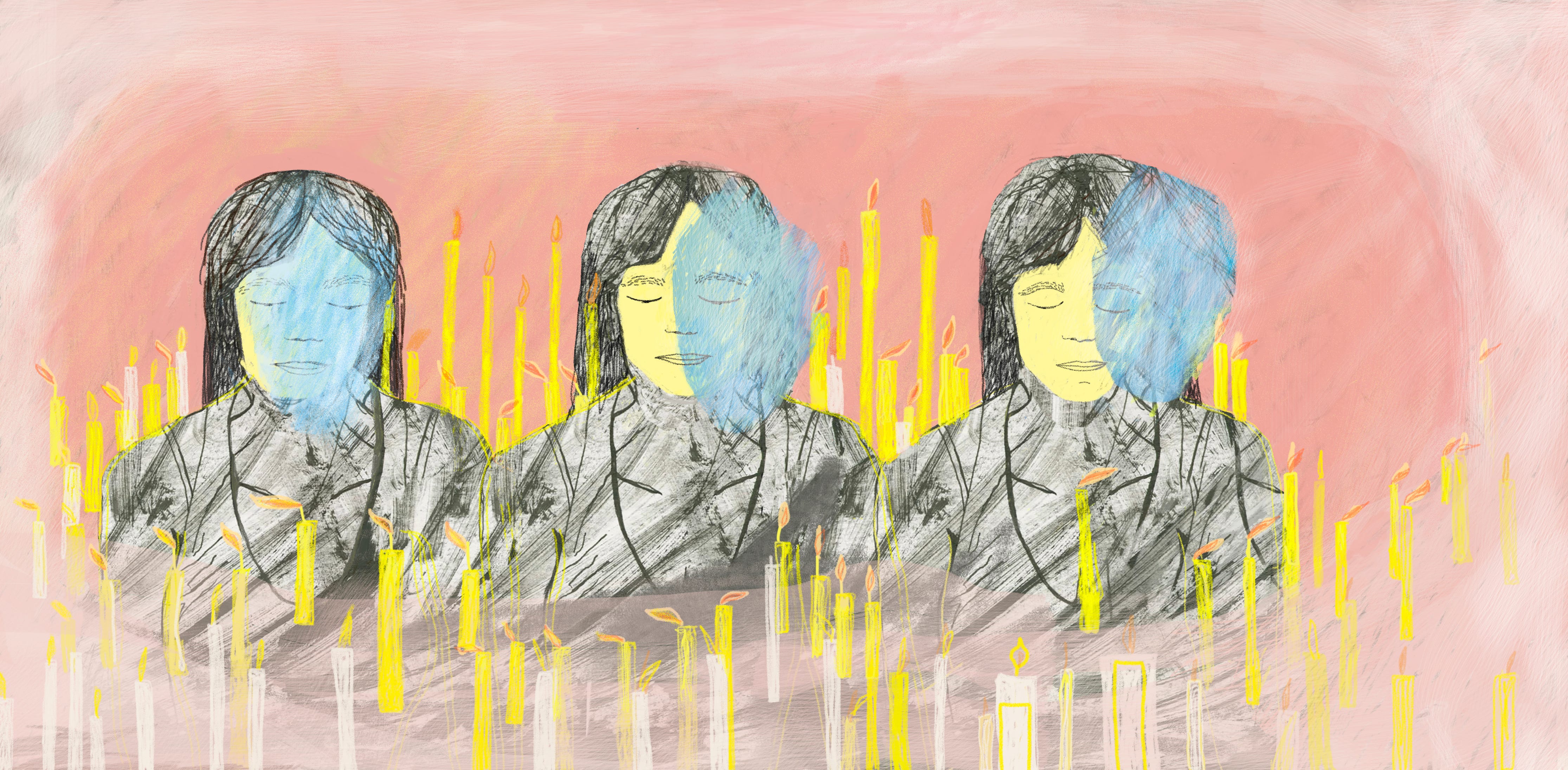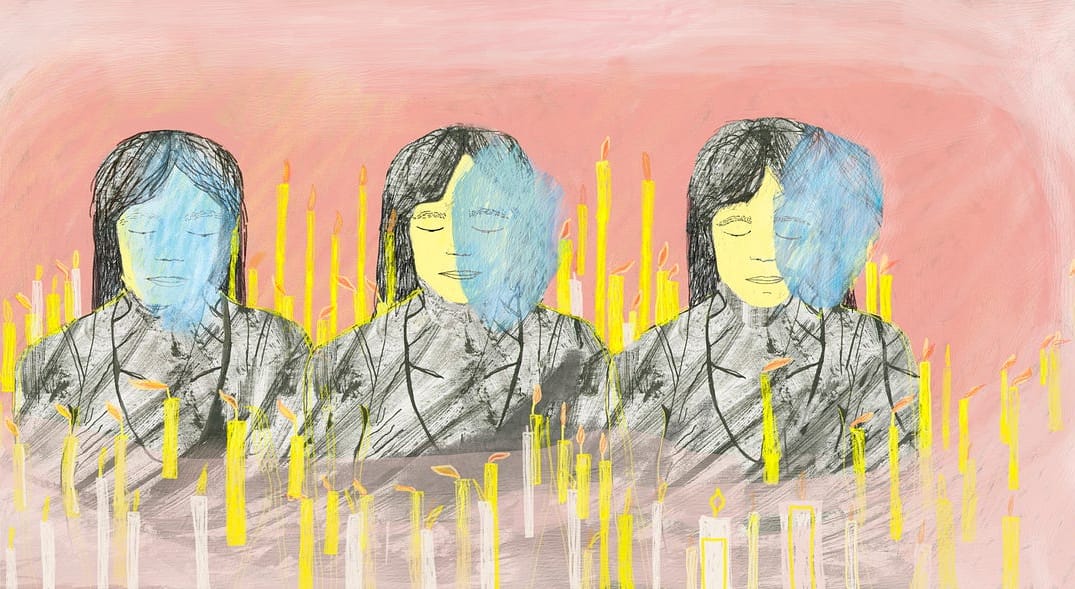
At the age of 18, I began to take on titles—not the titles we grow familiar with as children, but titles that belonged solely to me. These were fully my responsibility and gave me a sense of power and agency that my childhood had lacked. Samara Reed was, in order of importance, a college student, a Christian, a proud Golden Bear and an English major.
When I first met Jesus, I was 17 years old. That might feel old to some, but having considered myself a Christian since early childhood, it seems odd that it took me a good 10 more years to actually meet the God I claimed to follow. But at 17 I found myself reading a book that outlined the radical nature of God’s love, exemplified primarily by the death of Jesus on the cross for the sole purpose of having a relationship with me, and felt the tremendous weight and beauty of that sacrifice for the first time. My heart stirred, and this ethereal God I had been espousing for years finally became real.
At a time when nearly all of us felt unknown, unloved and unwanted (I’m looking at you, high school), Christ became my supreme treasure because of the knowledge that I was His. I began to think of him as a Father—intimate, close and supportive. I began to hear His voice and understand the world as He saw it. I loved the person I had become—caring, joyful and free. All this came packaged in a clear before-and-after transformation, and the title “Christian” slowly climbed the hierarchy of my identities.
I quickly shed descriptions like “Republican”, “unaware of my own privilege” and “undying fan of capitalism” for more palatable identities, like “no party preference.” I kept “loves country music unironically” close to the chest and swapped out “English major” for “political science major.”
A year or so passed, and I started classes at Berkeley. New identities crossed my path — identities I had the responsibility to either accept or reject. I quickly shed titles descriptions like “Republican,” “unaware of my own privilege” and “undying fan of capitalism” for more palatable identities, like “no party preference.” I kept “loves country music unironically” close to the chest and swapped out “English major” for “political science major.”
Then, one day, an unfamiliar (yet strangely intimate) label fell in my path — depressed and anxious. This label was large; it was heavy; it was unwanted; and it stopped me in my tracks. There was a new sheriff in town, and he began dictating new habits: skipping class, binge-watching Netflix in bed, hiding in my bedroom, sleeping for 14 hours a day, forgetting to eat meals, isolating myself from those who care about me, stopping spending time with God and going to church, and — most damaging — accept everything I said as the truth.
Like a thief in the night, clinical depression stole both who I had become and the most important relationship in my life in one fell swoop.
This identity began to strip away the ones that used to take its place. I performed poorly in classes, so I had to knock “diligent student” off the list. “Good listener” and “caring friend” dropped away as a result of my apathy and negativity. A desire to hike the Berkeley hills turned into staring at the ceiling fan. I couldn’t go a full day without weeping in my car or a bathroom stall. I couldn’t work hard anymore; I couldn’t care about people anymore; I could barely even feed myself most days; and my relationship with God was nearly nonexistent. Like a thief in the night, clinical depression stole both who I had become and the most important relationship in my life in one fell swoop.
About 18 months in, I had my first suicidal thought. Honestly, it shocked me, and the shock quickly morphed into fury. Anger was the first emotion other than sadness I had felt in a year and a half, and it felt good. I directed it at the only one who I knew could take the weight of it, the only one who my mind knew, regardless of my perception, was still there with me in that empty room.
I gave Jesus an earful. I screamed and yelled at him about the injustice of my fate and the unfairness that I, his faithful and loving daughter, was given this lot. And somewhere in the middle of my diatribe, I fell to the floor in tears, grieving the immense loss I felt over who I had become as a result of my disease. To my surprise, Jesus joined me. He wrapped me up in his arms, held me as my body shook with sobs and wept with me. I realized I had been distancing myself from him, the same way I had distanced myself from my loved ones. I had been terrified to face him in my current state. How could the God of the universe possibly want something as tattered and deformed as my heart?
People don’t really like to think of joylessness and life in Christ as compatible. It isn’t intuitive that the God who came down and promised the abundance of life could still be God in the midst of depression. They like to say, “You have depression and anxiety; you aren’t depressed and anxious.”
I have struggled with a recent movement in the church that seeks to distance mental illness from identity. People don’t really like to think of joylessness and life in Christ as compatible. It isn’t intuitive that the God who came down and promised the abundance of life could still be God in the midst of depression. They like to say, “You have depression and anxiety; you aren’t depressed and anxious,” cleverly sidestepping the identity statement in favor of something more passive. I used to be one of those people. The power my mental illness possessed to dictate my behavior, my beliefs and my personality frightened me. I understand the desire to create distance in order to lessen its power. But I have come to recognize that there is great strength in claiming the things that have shaped you, for better or for worse.
“Nothing in my hands I bring, simply to the cross I cling,” the old hymn reads. I had come before the cross empty handed once before at age 17, and I found myself there again four years later. That first time, Christ had joined me anyway. Why should this be any different? Slowly, I began to internalize his voice. Where my depression had led me to crippling self-hatred, God spoke: “You are incredibly loved regardless of whether or not you get out of bed today. The most important thing about you isn’t that you are depressed and anxious; it is that you are mine, and I am here for you every step of this journey toward healing and wholeness.”
I’m not writing today to offer you happy Jesus answers. Faith isn’t a magical salve. Like all forms of healing, it requires diligence, patience and full participation. My journey to health has not been linear, and there is no clear end date in sight. Just a few weeks ago, in fact, I had my first panic attack in over six months. But over time I have reclaimed parts of myself I thought that I had lost forever to my depression, and if Jesus joined me in the deepest part of the pit, I knew that he was going to be with me in the process of climbing out.
I have learned how to articulate my disease to my family and friends in a way that is authentic and vulnerable. I have stopped hiding. And I can trace all these things back to that night on my living room floor — I equate it to waking up.
It has been almost three years since I was diagnosed with clinical depression and anxiety. My relationship with God is almost fully restored. I have reintegrated spiritual rhythms (like prayer and time reading the Bible) into my day, and I became a missionary on college campuses in order to be a spiritual resource for students who, like me, are dealing with mental health challenges. I currently have more good days than bad days, and I am able to make healthy choices that would have seemed impossible three years ago. I have learned how to articulate my disease to my family and friends in a way that is authentic and vulnerable. I have stopped hiding. And I can trace all these things back to that night on my living room floor — I equate it to waking up.
Second to meeting Jesus, battling depression and anxiety has been the most formative experience of my adult life. It has taught me empathy, granted me self-awareness, taught me about my weaknesses and shown me my strength. I hope I will never give my mental illness the amount of control I gave it in the first year and a half, but I don’t want to distance myself from it either. I have been granted the strength to own who I am.
On some days, I am not OK. I do not always feel understood and accepted by the Christian community because of my mental illness. But I am strong, and I know who I am. For now, that’s enough. Samara Reed: college graduate, laughs at food puns, loves The West Wing, is no longer afraid to spend time alone, genuinely enjoys coffee, reads for fun, has enough strength to fight her desire to cancel plans, is passionate about social justice, sometimes cries for seemingly no purpose. Samara Reed: deeply loved by God.







